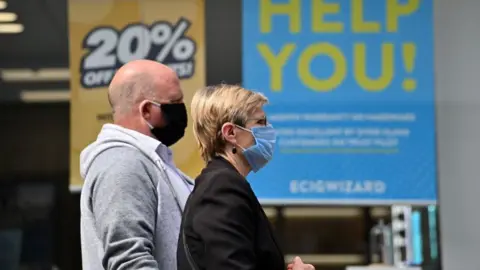Coronavirus: Wear masks in crowded public spaces, says science body
 Getty Images
Getty ImagesEveryone should carry a face covering when they leave home in order to tackle coronavirus, the head of the UK's national academy of science has said.
Prof Sir Venki Ramakrishnan, president of the Royal Society, said the coverings should then be worn "whenever you are in crowded public spaces".
He said evidence shows they protect the wearer and those nearby, and the UK was "way behind" other countries in usage.
No 10 said the use of face masks is always kept "under review".
Current guidance on face coverings varies across the UK, but Public Health England previously said they did not need to be worn outdoors.
Speaking as the Royal Society published two reports on face coverings, Prof Ramakrishnan said the public remained "sceptical" about their benefits because "the message has not been clear enough" and guidelines have been inconsistent.
He added: "What we would like for the government is to be a bit stronger and clearer about the messaging and require it whenever you are in crowded public spaces where you cannot get more than two metres away from the next person.
"If you're in a crowded setting, you ought to wear a mask."
There are mixed feelings among the experts on the government's scientific advisory group, Sage, around the use of face coverings.
Some point to evidence that indicates coverings do not seem to slow the spread of flu when worn in Asian countries, and there are concerns they might give some a false sense of security.
But there is a consensus that they may reduce the risk of an infected person passing the virus on to someone else.
"We have been very clear about the benefits of people wearing face coverings," said the prime minister's official spokesman, following Prof Ramakrishnan's comments.
"Face coverings can help us protect others and reduce the spread of the virus if people are infected but not showing symptoms."
The Downing Street spokesman added that face coverings "should cover both the nose and mouth to reduce the spread of coronavirus droplets, helping to protect others".
The government has said that face coverings can be made at home from cloth, and do not need to be hospital-standard masks.

What is the current guidance on face coverings?
Face coverings are compulsory on public transport in England, where they should also be worn in hospitals by staff, outpatients and visitors. People visiting shops are also advised, but not required, to cover their face if they judge that social distancing is not always possible.
In Scotland, masks are also mandatory on public transport, and will be in shops from 10 July.
People in Wales are being asked to wear non-medical face coverings where social distancing is not possible - including on public transport. But the government stopped short of making their use mandatory.
Plans to make wearing face masks on public transport compulsory in Northern Ireland have been put on hold, pending legal clarification.

In late April, only about 25% of people in the UK wore face coverings, compared to 83.4% in Italy, 65.8% in the United States and 63.8% in Spain, according to one of the reports, which examined the factors limiting the take-up.
Not wearing a face covering should be regarded as "anti-social" in the same way as drink driving or failing to wear a seatbelt, Prof Ramakrishnan said.
"Not doing so increases the risk for everyone, from NHS workers to your grandmother," he said.
The World Health Organization changed its advice on face coverings in June, saying they should be worn in public where social distancing is not possible to help stop the spread of coronavirus - but countries set their own guidelines and laws.
The WHO had previously argued there was not enough evidence to say that healthy people should wear masks, despite their widespread use in many countries.

- SOCIAL DISTANCING: What are the rules now?
- BUBBLES: How do they work and who can be in yours?
- TESTING: Who can get a test and how?
- TWO METRES: Could less than 2m work?
- THE R NUMBER: What it means and why it matters

Prof Paul Edelstein from the University of Pennsylvania, who wrote the other report which examined the effectiveness of masks and other coverings, said the evidence that they protected other people was "clearer all the time", but there was also "some evidence" they protected the wearer.
"There are people without symptoms going about their daily business who are unknowingly breathing out droplets that are carrying the virus," he said.
"If they had their faces covered the majority of those droplets would be caught before they can infect other people. Wearing face coverings can help save lives and prevent disabling illnesses."

- COVID-19 TESTING: Has it gone wrong?
- CORONAVIRUS NEWSCAST: The true impact of Covid-19 on travelling abroad

